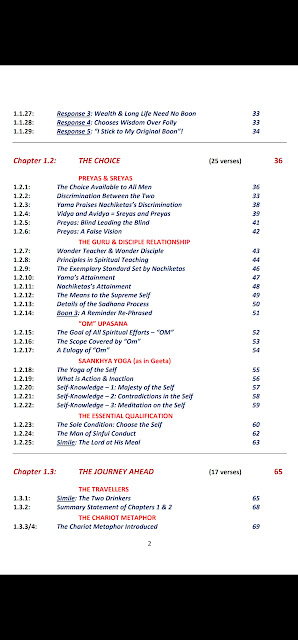1.2
Yama said: The good is one thing; the pleasant, another. Both of these, serving different needs, bind a man. It goes well with him who, of the two, takes the good; but he who chooses the pleasant misses the end. (1.2.1)
Many there are who do not even hear of Atman; though hearing of Him, many do not comprehend. Wonderful is the expounder and rare the hearer; rare indeed is the experiencer of Atman taught by an able preceptor. (1.2.7)
Yama said: The goal which all the Vedas declare, which all austerities aim at and which men desire when they lead the life of continence, I will tell you briefly: it is Om. (1.2.15)
This syllable Om is indeed Brahman. This syllable is the Highest. Whosoever knows this syllable obtains all that he desires. (1.2.16)
The knowing Self is not born; It does not die. It has not sprung from anything; nothing has sprung from It. Birthless, eternal, everlasting and ancient, It is not killed when the body is killed. (1.2.18)
This Atman cannot be attained by the study of the Vedas, or by intelligence, or by much hearing of sacred books. It is attained by him alone whom It chooses. To such a one Atman reveals Its own form. (1.2.23)
He who has not first turn away from wickedness, who is not tranquil and subdued and whose mind is not at peace, cannot attain Atman. It is realised only through the Knowledge of Reality. (1.2.24)
1.3
Two there are who dwell within the body, in the intellect, the supreme akasa of the heart, enjoying the sure rewards of their own actions. The knowers of Brahman describe them as light and shade... (1.3.1)
We know how to perform the Nachiketa sacrifice, which is the bridge for sacrificers; and we know also that supreme, imperishable Brahman, which is sought by those who wish to cross over to the shore where there is no fear. (1.3.2)
Know the atman to be the master of the chariot; the body, chariot; the intellect, the charioteer; and the mind, the reins. (1.3.3)
A man who has discrimination for his charioteer and holds the reins of the mind firmly, reaches the end of the road; and that is the supreme position of Vishnu. (1.3.9)
Beyond the senses are the objects; beyond the objects is the mind; beyond the mind, the intellect; beyond the intellect, the Great Atman; beyond the Great Atman, the Unmanifest; beyond the Unmanifest, the Purusha. Beyond the Purusha there is nothing: this is the end, the Supreme Goal. (1.3.10/11)
The wise man should merge his speech in his mind and his mind in his intellect. He should merge his intellect in the Cosmic Mind and the Cosmic Mind in the Tranquil Self. (1.3.13)
Arise! Awake! Approach the great and learn. Like the sharp edge of a razor is that path, so the wise say−hard to tread and difficult to cross. (1.3.14)
Having realised Atman, which is soundless, intangible, formless, undecaying and likewise tasteless, eternal and odourless; having realised That which is without beginning and end, beyond the Great and unchanging−one is freed from the jaws of death. (1.3.15)











